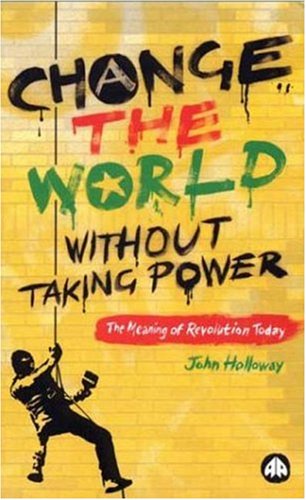John Holloway: Change the World without Taking Power: The Meaning of Revolution Today (2002)
Filed under book | Tags: · activism, anarchism, marxism, revolution, social movements

“The series of demonstrations since Seattle have crystallised a new trend in left-wing politics. Popular support across the world for the Zapatista uprising and the enthusiasm which it has inspired has led to new types of protest movement that ground their actions on both Marxism and Anarchism. These movements are fighting for radical social change in terms that have nothing to do with the taking of state power. This is in clear opposition to the traditional Marxist theory of revolution which centres on taking state power. In this book, John Holloway asks how we can reformulate our understanding of revolution as the struggle against power, not for power.
After a century of failed attempts by revolutionary and reformist movements to bring about radical social change, the concept of revolution itself is in crisis. John Holloway opens up the theoretical debate, reposing some of the basic concepts of Marxism in a critical development of the subversive Marxist tradition represented by Adorno, Bloch and Lukacs, amongst others, and grounded in a rethinking of Marx’s concept of ‘fetishisation’– how doing is transformed into being.
The struggle for radical change, Holloway argues, far from being marginalised, is becoming more and more embedded in our everyday lives. Revolution today must be understood as a question, not as an answer.”
First published 2002
New edition
Publisher Pluto Press, 2005
ISBN 0745324665
237 pages
Change the World without Taking Power (English, 2nd ed., 2002/2005, updated on 2017-1-2)
Cambiar el mundo sin tomar el poder (Spanish, 2005, added on 2017-1-2)
Paul B. Hartzog: Panarchy: Governance in the Network Age
Filed under paper | Tags: · commons, governance, network culture, panarchy, peer production, politics, social movements
Paul Hartzog introduces the concept of panarchy, a sociopolitical field that emerges when connective technologies, which lower the threshold for collective action, enable cooperative peer-to-peer production – of knowledge, of tools, of power.
More info (author)
Comment (0)Ruth Reitan: Global Activism (2007)
Filed under book | Tags: · activism, globalisation, neoliberalism, social movements

This comprehensive study traces the transnationalization of activist networks, analyzing their changing compositions and characters and examining the roles played by the World Social Forum in this process.
Comparing four of the largest global networks targeting the ‘neoliberal triumvirate’ of the World Bank, the IMF and the World Trade Organization:
* the Jubilee anti-debt campaigners
* Via Campesina peasant farmers
* Our World Is Not For Sale
* and the anarchistic Peoples’ Global Action.
Written by a scholar-activist, the book highlights that despite their diversity, these collective actors follow a similar globalizing path and that networks in which solidarity is based on a shared identity perceived as threatened by neoliberal change are gaining strength. Social forums are depicted as a fertile ground to strengthen networks and a common ground for cooperative action among them, but also a battleground over the future of the forum process, the global anti-neoliberal struggle, and ‘other possible worlds’ in the making.
Global Activism will appeal to students and scholars interested in globalization, international relations, IPE and social movements.
Publisher Routledge, 2007
ISBN 0415455510, 9780415455510
Length 338 pages
More info (publisher)
More info (google books)

